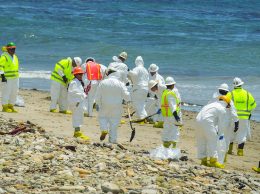Editorial: SB County oil cap vote is a slap in Santa Maria’s face
IN THIS ARTICLE
- Editorials Topic
- Editorial Board Author
By Editorial Board Friday, November 22nd, 2013
There’s almost nothing to like in the Santa Barbara County Board of Supervisors 3-2 vote to place a 10,000 ton limit on greenhouse gases from the proposed Santa Maria Energy project.
First, for a board that was beginning to put behind it the fractious atmosphere that has led to budget gridlock and a revolving door among county CEOs, this was a bitter blow.
Three supervisors stepped across district lines to put serious curbs on a project that was fully supported by the two supervisors whose districts would have been directly impacted — Peter Adam and Steve Lavignino.
Second, while this gives the environmentalists who opposed it a victory, it comes at a great price. There is always a chance that Santa Maria Energy will find ways to mitigate greenhouse gasses — hint: buy some lemon orchards and count them as offsets — to get under the 10,000 ton limit. Or it may break the project down into pieces that by themselves work within the new caps.
But the most important reason to dislike this particular vote is that it does nothing to set in place an economic development strategy for Santa Barbara County.
Does the county want extractive industries or does it want to reject them wholesale, like San Luis Obispo County has done? Does it place any value at all on jobs that pay head-of-household wages? Does it have a path to a sustainable revenue future other than killing industrial projects and entitling mansions that pay big property tax bills? Does it have a way to balance relative wealth in the South County and high unemployment in the North? And who will pay the social cost of these income imbalances?
So far the Board of Supervisors has hit a roadblock in getting Rick Caruso’s proposed Miramar Hotel in Montecito off the ground because it has not found a way to say yes or no to his demand for a multimillion-dollar tax abatement to get construction going. It has not found a way to deal with the Chumash on the tribe’s plans for the former Fess Parker property, Camp 4, in the Santa Ynez Valley.
Now it has slammed the door on the fingers of the Santa Maria Energy project — but not taken a stand that shuts that door completely. The approach has been, ‘If we can’t block it, we’ll regulate it in to nonprofitability.’
Meanwhile, the city of Santa Maria and key North County stakeholders continue to fund an Economic Development Commission and efforts at the Lompoc Chamber of Commerce, with limited cooperation from county government.
This is no way to run things. The better way is to do what Ventura County is doing and what SLO County has already done: Gather up the key stakeholders, including business and government, and create the mechanism for charting a future for economic development on a county-wide basis.
That is the real challenge. The alternative is an ad hoc series of decisions that are a de facto policy that amounts to no policy at all.
Related Articles
 Friday, October 21st, 2022
Friday, October 21st, 2022











